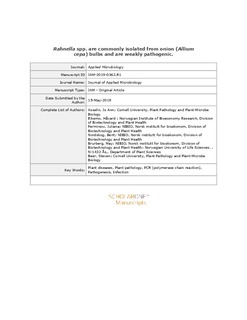Rahnella spp. are commonly isolated from onion (Allium cepa) bulbs and are weakly pathogenic
Asselin, Jo Ann E.; Eikemo, Håvard; Perminow, Juliana; Nordskog, Berit; Brurberg, May Bente; Beer, Steven Vincent
Journal article, Peer reviewed
Accepted version
Permanent lenke
http://hdl.handle.net/11250/2625145Utgivelsesdato
2019Metadata
Vis full innførselSamlinger
Sammendrag
Aims Bacterial decays of onion bulbs have serious economic consequences for growers, but the aetiologies of these diseases are often unclear. We aimed to determine the role of Rahnella, which we commonly isolated from bulbs in the United States and Norway, in onion disease. Methods and Results Isolated bacteria were identified by sequencing of housekeeping genes and/or fatty acid methyl ester analysis. A subset of Rahnella spp. strains was also assessed by multilocus sequence analysis (MLSA); most onion strains belonged to two clades that appear closely related to R. aquatilis. All tested strains from both countries caused mild symptoms in onion bulbs but not leaves. Polymerase chain reaction primers were designed and tested against strains from known species of Rahnella. Amplicons were produced from strains of R. aquatilis, R. victoriana, R. variigena, R. inusitata and R. bruchi, and from one of the two strains of R. woolbedingensis. Conclusions Based on binational testing, strains of Rahnella are commonly associated with onions, and they are capable of causing mild symptoms in bulbs. Significance and Impact of the Study While Rahnella strains are commonly found within field‐grown onions and they are able to cause mild symptoms, the economic impact of Rahnella‐associated symptoms remains unclear.
